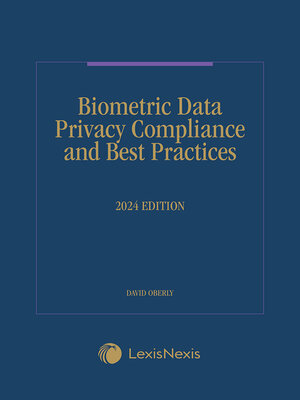
Sign up to save your library
With an OverDrive account, you can save your favorite libraries for at-a-glance information about availability. Find out more about OverDrive accounts.
Find this title in Libby, the library reading app by OverDrive.



Search for a digital library with this title
Title found at these libraries:
| Loading... |
Written by David J. Oberly, one of the nation's foremost thought leaders in the biometric privacy space, Biometric Data Privacy Compliance and Best Practices is the first and only full-length treatise of its kind to provide a comprehensive compendium of biometric privacy law at all three levels of U.S. government, as well as detailed, practical guidance for developing comprehensive compliance programs in connection with the day-to-day utilization of biometric data in commercial operations.
Just years ago, the thought of being able to unlock your phone with your face, or "punch in" at work using only your fingerprint, seemed like pure science fiction. Fast forward to today, and biometric data is now heavily relied upon in a range of different commercial contexts to enhance the efficiency, effectiveness, and security of business operations in a number of ways.
The use of biometric data provides companies across all sectors with a myriad of benefits, including enhancements to the consumer experience, convenience, security, and fraud reduction—just to name a few. At the same time, biometric data also presents a unique set of challenges, particularly in the areas of privacy, security, transparency, and discrimination/bias.
More than that, the use of biometrics today also exposes companies to notable legal risks and particularly outsized liability exposure. Due to concerns regarding the collection, use, and storage of biometric data in a safe and responsible manner, lawmakers across the United States have sought ways to strictly regulate the commercial use of biometric technologies. Already, several states and municipalities have enacted laws that place stringent requirements and limitations over the collection and use of biometric data. To further complicate matters, states and cities from coast to coast—as well as federal lawmakers on Capitol Hill—have made it a top priority to enact additional strict laws regulating the use of all forms of biometrics.
The biometric privacy legal landscape is uncertain and ever-evolving, and requires companies and their counsel to navigate an increasingly-complex patchwork of varying laws and regulations. As time progresses, nature and scope of legal risks associated with biometric data will continue to trend upward. As such, it is essential for companies that use, or intend to use, biometrics in their operations to embrace a proactive stance to compliance by implementing strategic risk management measures to mitigate the immense liability exposure inherent in the use of facial, voice, fingerprint, and similar types of biometric technologies.
Biometric Data Privacy Compliance and Best Practices is complete with charts and checklists. This definitive, authoritative legal guide is the go-to tool for navigating the rapidly-changing biometric privacy landscape, managing legal risks, and mitigating liability exposure when attempting to leverage the benefits of biometrics in the commercial arena—and an invaluable resource for corporate c-suite executives, in-house legal teams, outside counsel, and compliance personnel.






